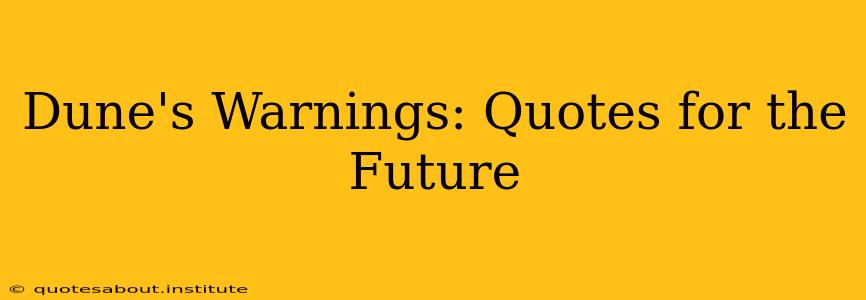Frank Herbert's Dune is more than just a science fiction epic; it's a tapestry woven with prescient warnings about the future of humanity. Through its complex characters and intricate plot, the novel explores themes of ecology, politics, religion, and technology that resonate deeply with our contemporary world. While the setting is far removed from our own, the lessons embedded within its pages remain chillingly relevant. This exploration delves into some of Dune's most impactful quotes and examines their enduring significance in our modern context.
What are the main themes of Dune?
The core themes of Dune are multifaceted and intricately intertwined. Ecology is central, illustrated by the harsh desert environment of Arrakis and the devastating consequences of unchecked exploitation of its resources. Politics, power struggles, and the manipulation of religion are constant threads throughout the narrative. The dangers of unchecked technological advancement and the seductive nature of absolute power are also explored in great depth. Finally, the human element, with its capacity for both great good and terrible evil, is perhaps the most enduring theme, reminding us of our own fallibility and potential for both destruction and creation.
What are some of the most important quotes from Dune?
Many quotes from Dune have achieved iconic status, encapsulating the novel's profound insights. Let's examine a few:
"Fear is the mind-killer."
This concise yet powerful statement speaks to the crippling effects of fear on rational thought and action. In a world fraught with danger, allowing fear to dominate can lead to paralysis and ultimately, defeat. This resonates profoundly today, reminding us to confront our fears rather than allowing them to dictate our choices. In an age of escalating global uncertainty, this quote serves as a powerful call to courage and clear thinking.
"He who controls the spice controls the universe."
This famous line highlights the power dynamics inherent in the control of resources. Melange, the spice, is not just a commodity; it is the key to interstellar travel and extended life, making it a source of immense power. The quote serves as a stark reminder of the potential for conflict over limited resources, a theme as relevant today as it was when Herbert penned his masterpiece. The struggle for control over vital resources, whether it be oil, water, or rare earth minerals, continues to shape global politics and international relations.
"A beginning is the time for taking the most delicate balance, to tip it in one direction or another."
This highlights the profound consequences of seemingly small choices, especially at pivotal moments in history. Every decision, no matter how insignificant it may appear, has the potential to trigger a chain reaction with far-reaching consequences. This idea echoes through the ages and applies equally to individuals and nations. Considering the long-term implications of our choices, both big and small, is crucial for responsible decision-making.
"Think of the size of the universe, and then the size of your troubles."
This quote emphasizes the insignificance of personal problems when viewed in the context of the vastness of the cosmos. It's a reminder to maintain perspective, particularly during times of adversity. While our personal challenges may seem insurmountable, understanding our place in the larger scheme of things can provide a valuable sense of proportion and encourage resilience. In an age of constant connectivity and readily available information, this call for perspective is increasingly necessary to counteract the sense of overwhelm that can accompany modern life.
What is the significance of Dune's warnings for the future?
Herbert's warnings in Dune are not simply predictions; they are cautionary tales. The novel's exploration of ecological collapse, political manipulation, and the dangers of unchecked power serves as a potent reminder of the potential pitfalls of humanity's trajectory. By understanding the lessons embedded within its pages, we can potentially avert some of the catastrophic outcomes described in the book. The themes of sustainable resource management, ethical governance, and the importance of critical thinking are as relevant today as they were when Dune was first published, making it a timeless work of both science fiction and social commentary. Its continued popularity and enduring relevance solidify its position as more than just a novel; it's a timeless warning, a call to action, and a testament to the enduring power of storytelling.

